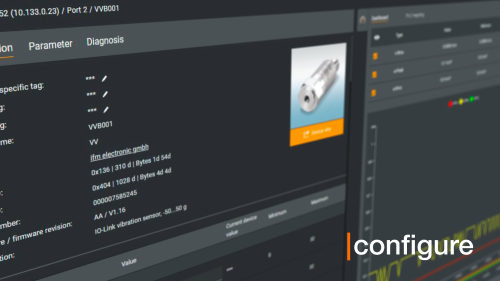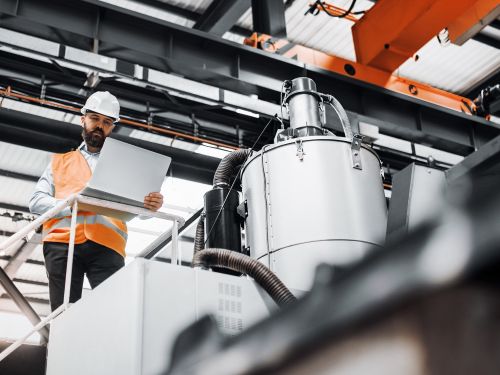- moneo: IIoT platform
- Use cases
Continuous level measurement on tanks of a CIP system with moneo RTM and radar sensors
Level monitoring with radar sensors
Measurement of the levels in storage tanks of a CIP test facility with radar sensors and their visualisation, monitoring and documentation with moneo RTM.
Initial situation
The tanks are monitored via two limit switches.
These report to the control system via a switching signal
- whether the tank is empty
- or whether the tank is full.
Levels in between cannot be detected.
Thus, it can only be detected to a limited extent how much of which medium is actually available at that moment.
Aim of the project
The aim of the project is to ensure the plant availability. By precisely detecting the level of the cleaning medium in the tanks, moneo is to inform the operator in good time when to organise the supply of the respective media.
The monitoring system is to be implemented without interfering with the control of the CIP system.
This is realised by continuous level measurement including data analysis.
Implementation
The moneo RTM software is centrally installed on a server.
One radar level sensor of the type LW2720 was installed on each of the 4 storage tanks.
The data from the radar sensors is connected to the server via an IO-Link master using an internal VLAN.
After installing the sensors, only the reference height must be set. This can be done with the following tools, for example:
- moneo configure (part of moneo, separate licence QMP020 required)
- moneo blue app (IO-Link Bluetooth adapter EIO330 is additionally required)
The reference height is used to define the zero point and thus the reference point for the level measurement.
Result
Organisation of needs-based maintenance
The availability of the plant was ensured by continuous level measurement and data analysis with moneo RTM. It is ensured that there is a sufficient quantity of medium in the tank.
Data acquisition and transparency are used to organise the timely procurement of refill media.
In addition to process control, further process analyses and the assessment of expected consumption quantities are possible with the help of the historical data.
The remote data access is another advantage of moneo.
Dashboard
Application-specific dashboards can be created quickly and easily here.
In this case:
Overview of all 4 tanks with the respective current level and volume

- Level in metres
- Volume in litres
Analysis
Via the analysis function, the user can analyse the tank level in detail. Because the level values are permanently recorded, this data can also be viewed over days, weeks and months (historical data).
- Empirical values about the availability of media.
- Shown here: Determining the time for emptying or filling operations.

- Level in metres
- Determining the time span of an emptying process
Settings & rules: Manage thresholds
The level in the tanks is monitored by means of static limit values. For this purpose, limit values have been defined that generate a warning or an alarm within moneo if they are exceeded or not reached.

- moneo "alarm type" (alarm/warning + exceeded/not reached)
- Limit value for the respective alarm type
- Response delay (update cycle = approx. 1 second)
Ticket processing rules
This function can be used to easily define what should happen after a warning or alarm has been triggered, e.g.:
- Email notification
- SAP integration
For applications where regular refilling is necessary, it is advisable to optimise the replenishment process.
For example by sending an email notification to a defined group of recipients responsible for the production supply as soon as the specified level in a tank is not reached anymore, so as to trigger the refilling process.
Calculated values
In addition to the process value of the level sensor, further useful parameters can be determined with the calculated values in moneo.
In this application, for example, not only the level is of interest but also the volume.
These are standing tank cylinders. For this tank geometry, the volume can be calculated using the "base area multiplied by height” calculation.

Dataflow Modeler
- Current tank level in m
- Factor for converting the unit of the data source, here 0.001 = m
- Base area of the tank in mm²
- Factor for converting the unit of the output, here 1,000,000 = litres
- Scaling of the unit in mm
- Base area in mm² multiplied by level in mm = volume in mm³
- Scaling of the output unit from mm³ to litres (dm³)
- Volume in litres as result of the calculation
Depending on the specific application, further calculations are possible:
- Calculation of shortfall quantity (total volume of the tank - current volume)
- Scaling level in percent
- Adding up the total quantity (volume tank 1 + volume tank 2.....), for determining the total quantity in the warehouse e.g. wine
Configuration with moneo configure
If the corresponding moneo configure licence is activated, the sensor parameter data can be read and written in moneo. To set up the radar level sensor, it is necessary to set the reference height. This can simply be entered in the corresponding parameter field and written to the sensor.

- Metadata of the sensor (device name, manufacturer...)
- Parameter data of the sensor, to configure the sensor
- Live data of the current process values



